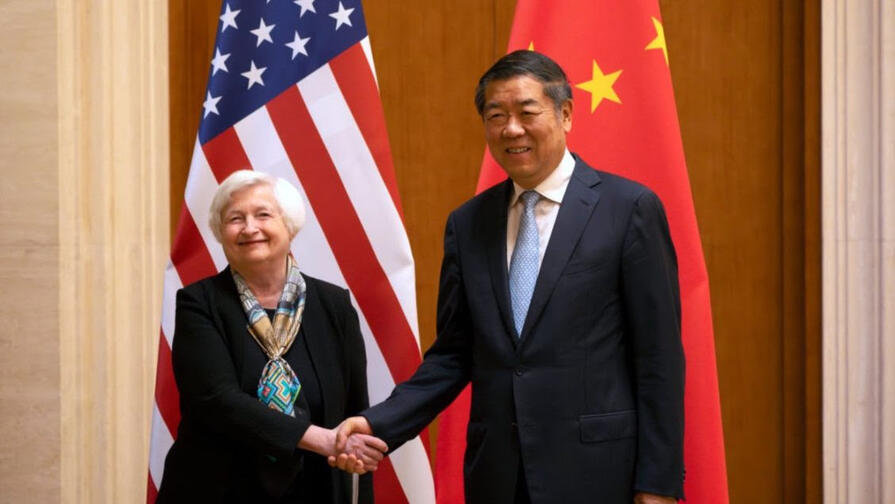Yellen Urges Cooperation in China Visit
U.S. Secretary of the Treasury Janet Yellen met with Chinese Premier Lǐ Qiáng 李强and Vice Premier Hé Lìfēng 何立峰 among other Chinese leaders last week. The visit came as China’s economy exhibits unexpected weakness, including in exports, but just after Beijing announced new restrictions on the export of two materials key to the production of semiconductors and other high tech components.
After her meetings, Yellen complained that China’s government treated U.S. firms unfairly, but again insisted that decoupling the world’s two largest economies would cause immense harm. She highlighted productive economic ties and expressed hope that more cooperation would be possible. China's leaders condemned U.S. economic sanctions and trade restrictions, but like Yellen, described the discussions as candid and said the visit was positive.
Yellen is the first woman to be Treasury Secretary (she was also the first to head the Council of Economic Advisors, 1997-1999, and the Federal Reserve, 2014-2018). She’s one of twelve women in Pres. Biden’s twenty-four member cabinet. No women are among the twenty-four members of the CCP Politburo. Shèn Yíqín谌贻琴, the former party secretary of Guizhou and a member of the Bai 白ethnic group, is the only woman among the 11 leaders of the State Council.
Human Rights Lawyers Still Under Pressure

It’s been eight years since roughly three hundred human rights lawyers were rounded up on July 9, 2015. Li Heping 李和平 and Wáng Quánzhāng 王全璋 were among those arrested. They were released but their families still complain of harassment, including eviction. Another human rights lawyer, Xǔ Zhìyǒng 许志永, was recently sentenced to fourteen years for the crime of subversion. Writing for US-China Today, Gloria Guo details the efforts of Li and Wang’s families to secure their release and what they continue to endure.
Remembering Nixon’s Bold China Move

Two way U.S.-China trade in goods and services exceeds $750 billion a year. In June 1971, Pres. Nixon ended the twenty-one year-old U.S. trade embargo against China. Trade that year totalled $5 million. But bigger news came on July 15, when Nixon announced from Southern California that he would go to China. He said, “there can be no stable and enduring peace without the participation of the People's Republic of China and its 750 million people.” Click here to watch his announcement and see his handwritten draft of it. Click here for our “Getting to Beijing” feature.
Henry Kissinger, his national security adivisor, had just returned from his secret mission to Beijing and advised Nixon about visiting China. On July 14, Kissinger wrote to Nixon:
“We have laid the groundwork for you and Mao to turn a page in history. But we should have no illusions about the future. Profound differences and years of isolation yawn between us and the Chinese. They will be tough before and during the summit on the question of Taiwan and other major issues. And they will prove implacable foes if our relations turn sour. My assessment of these people is that they are deeply ideological, close to fanatic in the intensity of their beliefs. At the same time they display an inward security that allows them, within the framework of their principles, to be meticulous and reliable in dealing with others.
“Furthermore, the process we have now started will send enormous shock waves around the world. It may panic the Soviet Union into sharp hostility. It could shake Japan loose from its heavily American moorings. It will cause a violent upheaval in Taiwan. It will have major impact on our other Asian allies, such as Korea and Thailand. It will increase the already substantial hostility in India. Some quarters may seek to sabotage the summit over the coming months.”
Eat-Steamers on Notice
The International Journal of Communication published by USC Annenberg has just published an article by Sijun Shen on the precarious place of China’s “eat-streamers.” The Chinese state once encouraged people to launch online careers, including those who developed an online following by consuming all sorts of foods. But then the state switched to condemning these practices which have been condemned by Chinese state media as “wasteful, immoral and profit-driven.” Ian Chiu, in USCI’s US-China Today in 2020, wrote about eat-streaming amidst a food crisis.
Summer Online Book Club Explores East Asian Cultures

Over the course of Chinese civilization, calligraphy has become a distinctive treasure of the nation's culture. It is not only used to communicate on paper but also serves as a representation of Chinese culture's ideological wisdom and spirituality. Step into the captivating world of calligraphy and explore the Chinese culture by joining our summer book club adventure about the children's literature Eighteen Vats of Water. Open to educators and librarians. Register now to secure your complimentary copy of "Eighteen Vats of Water.”




